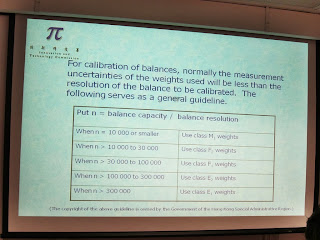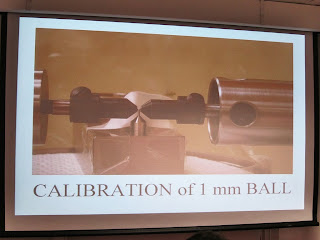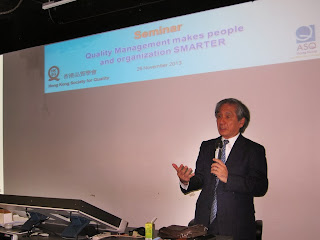HKQAA Symposium 2013 was organized by Hong Kong Quality Assurance Agency (HKQAA) annually and it was held on 29th November 2013. Hong Kong Society for Quality (HKSQ) was one of supporting organizations since 2006. The event counted as the final activities in World Quality Month 2013. The symposium’s frame entitled “
ESG Management - a Paradigm Shift in Business and Investment Strategies” and I summarized it below for sharing.
I took a photo with HKQAA friends in front of the symposium banner
(Left: Mr. KT Ting (General Manager, Market Research Business), I, Meico Cheong (Business Manager) and Mr. P.C. Chan (Chief Operating Officer))
Morning Session In the beginning, Ir. Dr. The Hon WK Lo (Chairman of HKQAA and Representative of the Engineering Functional Constituency of the Legislative Council) gave a welcoming speech. He mentioned the Environmental, Social and Governance (ESG) issues became more and more important in important on long-term benefit of enterprises.
The inaugural cooperation ceremony between HKQAA and Hang Seng for launching Hang Seng Corporate Sustainability Index Series was held. Group photo for all guests and HKQAA board members was taken.
Mr. Vincent Kwan (Director and General Manager, Hang Seng Indexes Company Limited) was the first speaker and his topic entitled "Relationship between ESG and investment in sustainable companies in HK and Mainland China". Mr. Kwan quoted "Sustainable Development as forms of progress that meet the needs of the present without compromising the ability of future generations to meet their needs."
Then Mr. Kwan mentioned Hong Kong coroporations ecology that there were 350,000 corporations and 2,824,000 employees in 2012 in which consumed 74% electricity and disposed 47% of solid waste at landfills. Therefore, corporation is a key stakeholder for developing a sustainable future for a society and the earth. Mr. Kwan introduced 5Cs (Corporation, Competition, Community, Corporate Sustainability and Corporate Social Responsibility) of Sustainability.

Mr. Kwan also briefed three routes to achieve Corporate Sustainability included "Regulation and Legislation", "Corporation's Initiative" and "Incentives". In addition, Responsible Investment is a driving force through providing incentive to a corporation for achieving sustainable development. It was found that Sustainable and Responsible Investment (SRI) funds in Asia growing significantly. So Sustainability Index acts as a bridge for companies and investors, it is a tool to translate ESG factors into financial language that is comparable. The ESG ratings were showed as following diagram in which industry included Financials, Properties & Construction, IT, Telecommunications, Utilities, Conglomerates, Energy, Consumer Goods & Service, Industry Goods and Materials.

Ms. Connie Sham (Senior Manager of Strategic Business, HKQAA) was the second speaker and her presentation title was "Overview of Hang Seng Corporate Systainability Index Rating Model and Result of Hong Kong Carbon Performance Survey 2013". She said CSR was a moral issue in 2000 but it was an Strategic / profit issue in 2013.
Ms. Sham said CSR Advocate Index had launched since 2008 and HKQAA Sustainability Performance Assessment used new version of CSR index which was in line with the Hang Seng Sustainability Index Rating Model (See below).
Then Ms. Sham reported HKQAA-HKJC Carbon Disclosure e-Platform (CDeP) results. There were 20 organizations participated and total GHG emissions reported as of 31 Oct 2013 that was 76,402,687 tCO2e. The emission data summary was showed in the following diagram.
Finally, Ms. Sham concluded that many responding companies were committed in emission reduction. The scheme had many advantages such as reduced cost, increased productivity, strengthened brand and reduced risk can be observed. Let's join hands to work on CSR Index and Carbon Disclosure.
The third speaker was Mr. Timothy Hui (Director, GRI China) and his presentation named "Sustainability Reporting Landscape & GRI-G4". Global Reporting Initiative (GRI) was launched by UNEP and CERES since 1997. GRI's Mission is to make sustainability reporting standard practice by providing guidance and support to organizations.

Mr. Hui introduced GRI Ten Principles to us. The Principles for Defining Report Content included "Stakeholder Inclusiveness", "Sustainability Context", "Materiality" and "Completeness"; and the Principles for Defining Report Quality included "Balance", "Timeliness", "Comparability", "Clarity", "Accuracy" and "Reliability". The diagram to visualize representation of prioritization of aspects was shown.
After networking break, the forth speaker was Ir. Sai-king Ho (Assistant Director (Building Services), Architectural Services Dept. (ASD), HKSAR) and his presentation topic was "Experience Sharing: The journey of G4 Sustainability Reporting".
Ir. Ho shared their experience with GRI G4 in sustainability included Resources Utilization, Conservation, Social Participation and Staff Development, as well as, Partnering with Stakeholder. The benefits achieved such as understanding their own sustainability status, meeting stakeholder expectation and demonstrating the commitment to sustainability and getting public recognition. The diagram of ASD reporting journey was shown below.
The last speaker of morning session was Dr. Nigel Croft (Chairman, ISO Technical Subcommittee on Quality Systems (ISO/TC176/SC2) and his topic named "Promoting sustainability using management systems - upcoming changes to ISO 9001 and ISO 14001". Dr. Nigel Croft asked us to dream of a sustainable planet included Economic growth, Environmental integrity and Social responsibility and then he commented simply dreaming was not enough but by what method to achieve it.
The Dr. Nigel Croft mentioned management system defined as a system to establish policy and objectives and to achieve those objectives that meant "Results Focused". So that ISO 9001 aimed "Consistent, Comforming Goods & Services"; ISO 14001 aimed "Prevention of pollution"; OHSAS 18001 aimed "Safe working conditions"; ISO 50001 aimed "Efficient energy usage" and ISO 22000 aimed "Safe food", etc.
Nigel's 3 core concepts were described:
1. Identify the processes needed to achieve the planned results
2. Continually monitor the risks (Cause and Effect)
3. Manage the processes and the system using "Plan-Do-Check-Act"
The different ISO standards positioning were demonstrated.
Finally, Dr. Nigel Croft concluded that ISO management system standards would be better aligned in future to facilitate integrated deployment and the revision process for ISO 9001 and ISO 14001 was underway and expected to be published in Sep 2015.
Panel Discussion was performed at the end of Morning Session and the guest moderator was Dr. Nigel Croft (ISO Technical Subcommittee on Quality Systems (ISO/TC176/SC2)).
Afternoon Session Dr. Micheal Lam (CEO, HKQAA) gave an opening speech in the afternoon session. He introduced new sustainability Index and CDeP, etc.
Award ceremony of CRS index, ISO 50001 and ISO 22301 were performed and group photo was taken.
Panel Discussion entitled ESG Implementation, Energy Improvement and Business Continuity was performed in the beginning of Afternoon Session and the guest moderator was Mr. KT Ting (General Manager, Market Research Business) (in the middle). The first panelist was Ms. Katherine Lau (Fuji Xerox (HK) Ltd) and she shared her company's 3 pill that was Strong, Kindness and Interesting. Another panelist was Mr. Lewis Lam (Assistant General Management (Property Management), Kai Shing Management Service Limited) and he shared ISO 22301 experience such as "Backup on Backup" and FMEA implementation.
The sixth speaker was Mr. Victor Kwong (Head of Corporate Health, Safety & Environment) and his presentation topic entitled "Good Practice Sharing of Methodical Carbon Management". Mr. Kwong briefed Towngas corporate profile first.
The details of Towngas energy system was described. The vision and mission of Towngas were "Greening up your life" and "To be Asia's leading energy supplier and provider, with an environmentally friendly focus, and to strive for ensuring health & safety at work, and to minimize HSE and climate change risks."
Carbon Management System was introduced. It included:
- Carbon Management Taskforce
- GHG Inventory Accounting Procedures
- Carbon Audit
- Carbon Performance and Analysis
- Carbon Reduction Initiatives and Targets
- Carbon Disclosure
The effective cooking tips were discussed.
The seventh speaker was Dr. David Chui (Partner, XCES Capital Advisory (Associate Professor and Chairperson of Economics & Finance, Hang Seng Management College)) and his presentation named "Social responsibility governance: is it a sustainable investment strategy for hedge fund".
Firstly, Dr. Chui explained sustainable investment that "Sustainable investment in its simplest form is the ability to continue, and for a long-term investor, it is critically important. Long-term value creation requires the effective management of three forms of capital: financial, human and physical - this is why investors are concerned with environmental, social, and governance (ESG) issues." Secondly, he introduced Hedge Fund Strategies included Thematic (ESG is in season) below.
Thematic hedge funds included environmental protection; clean & efficient energy; sustainable infrastructure and development; health & well-being and social equity, Asia versus West, etc. The key issue is indicated if ESG incorporation put limitations on the risk and return objectives. One of challenges was barriers to ESG transparency in Asia.
The last speaker in afternoon session was Mr. KL Wong (CEO & ED, Hong Kong Housing Society) and his topic entitled "Sustainable Housing Development for an Aging Society - International Trends and Perspectives". Hong Kong population ageing was ranked number 9 (Median Age = 41.4) in World Population Ageing 2009, United Nations.
The following diagram demonstrated the demographics characterisitics in Hong Kong after 30 years. Elderly Units in Retal Estates demand would be increased seriously. Then Mr. Wong introduced Senior Citizen Residences (SEN) and Ageing-In-Place (AIP) schemes. Quality Retirement Living was the aim of Hong Kong Housing Society through Sustainable Housing development matching with Ageing Trend.
Panel Discussion was performed at the end of Afternoon Session and the guest moderator was Ir. C.S. Ho (Deputy Chairman, HKQAA).
At the end of the symposium, Ir. C.S. Ho (Deputy Chairman, HKQAA) gave a closing remarks.
Previous HKQAA Symposium:2012: Part 1 -
http://qualityalchemist.blogspot.hk/2012/12/hkqaa-symposium-2012-part-1.html; Part 2 -
http://qualityalchemist.blogspot.hk/2012/12/hkqaa-symposium-2012-part-2.html2011:
http://qualityalchemist.blogspot.hk/2011/11/hkqaa-symposium-2011-performing-your.html 2010: Part 1 -
http://qualityalchemist.blogspot.com/2010/11/hkqaa-symposium-2010-sustainability.html ; Part 2 -
http://qualityalchemist.blogspot.com/2010/11/hkqaa-symposium-2010-sustainability_26.html 2009:
http://qualityalchemist.blogspot.com/2009/11/smaller-carbon-footprint-hkqaa.html 2008:
http://qualityalchemist.blogspot.com/2008/12/hkqaa-symposium-2008-green-day.html Reference:www.hkqaa.orgwww.hksq.org





















































